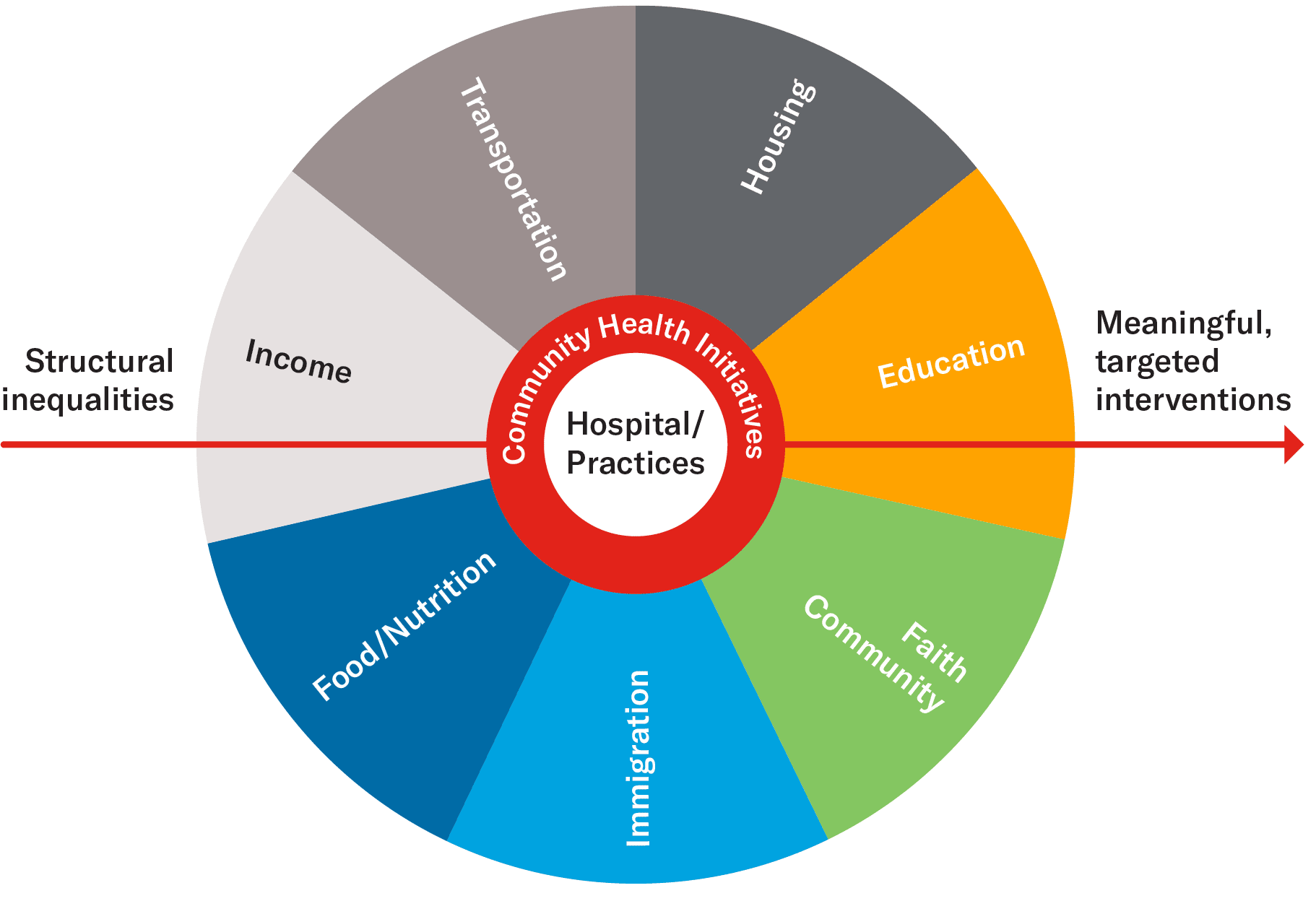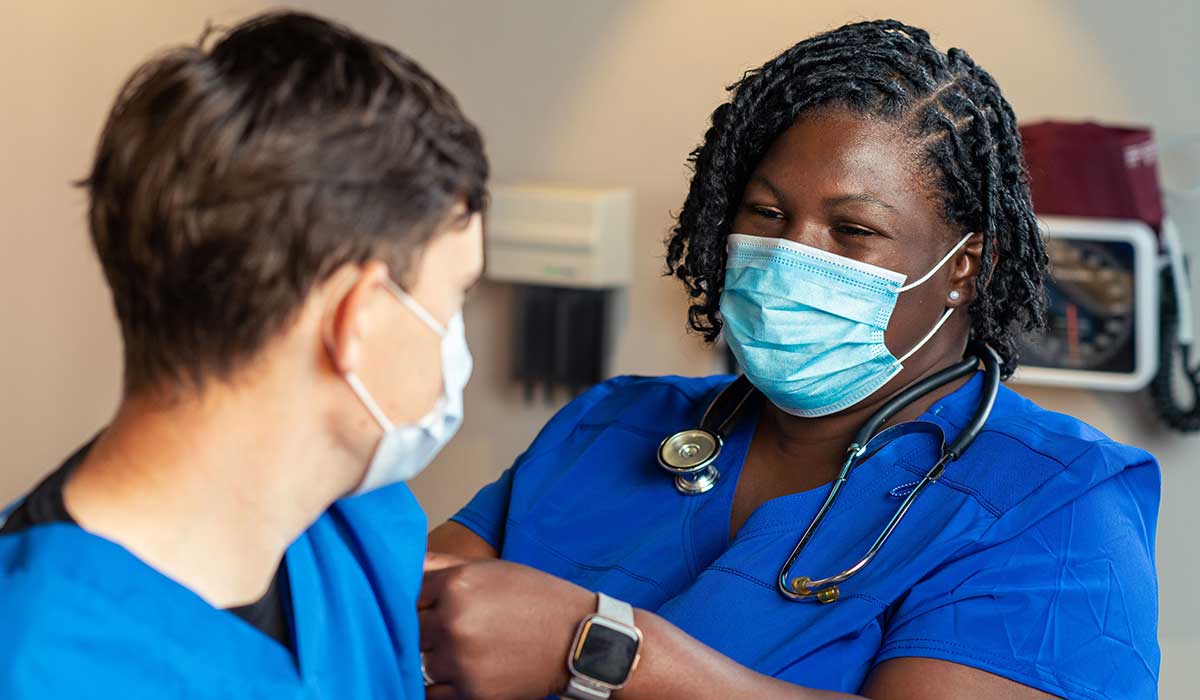NewYork-Presbyterian
As we navigate the complexities of a post-pandemic world, the commitment to addressing social determinants of health remains at the forefront of our mission at NewYork-Presbyterian. Our dedicated efforts have centered around reengaging with our communities in a safe and positive manner, forging true partnerships that redefine equitable access to care.
Our approach involves turning to our community members and fostering true partnerships. Collaborating closely with clinical and community partners, we have co-developed and implemented programs aligned with community-informed domains of focus. Simultaneously, we have tackled crucial issues like access to health care, navigation, and social determinants of health.
While the concept of social determinants of health is not new, our communities’ support, knowledge, and resilience have enabled us to redefine what equitable access to care means in this post-pandemic era. The achievements under this new norm have been truly remarkable, showcasing the strength and adaptability of our collective efforts.
The programs operating under Maternal and Child Health, Chronic Disease Prevention and Management, Behavioral Health, Youth Development, and Sexual and Reproductive Health have been nothing short of phenomenal in addressing the unique needs of their respective populations. Each program has consistently strived for excellence, both within our hospital walls and beyond, ensuring the provision of the best possible care to our community members.
This report stands as a testament to the outstanding model we have collectively created—an innovative framework that facilitates high-quality care within and outside our hospital walls. It is a foundation that propels us forward in our unwavering commitment to pioneering health justice.
To the members of the Division of Community & Population Health, I extend my heartfelt gratitude. Thank you for another year of remarkable accomplishments and milestones. Your dedication has been instrumental in shaping our success, and I look forward to continuing this transformative journey together.
Sincerely,
Tiffany Sullivan, MPH
Senior Vice President & Chief Operating Officer
NewYork-Presbyterian Physician Services
NewYork-Presbyterian Hospital’s Division of Community & Population Health collaborates with community partners across New York City and Westchester County to improve the health and well-being of the communities we serve, with the goal of achieving health equity for all.
We connect community members and patients with medical, social, and behavioral health care through a wide range of community health programs and practices for children, adolescents, and adults.
The Division of Community & Population Health Includes: Ambulatory Care Network (ACN), Community Health, Care Coordination, Accountable Care Organization (ACO), Access, and Quality.

Guiding Principles:
In partnership with the New York Academy of Medicine, NewYork-Presbyterian conducts a comprehensive Community Health Needs Assessment (CHNA) every three years to gain an updated understanding of the health and social needs of the communities we serve. The findings of the CHNA help inform the development of the Community Service Plan (CSP) which, in alignment with New York State’s Prevention Agenda, outlines the health priorities NewYork-Presbyterian will address and the approach to each one. In addition, the data are utilized to identify priority communities of high need where the CSP interventions are implemented.
The Division develops and implements the CSP programs across the health system by leveraging resources from both the community and within NewYork-Presbyterian. CSP programs address local health disparities through evidenced-based population health initiatives, care provider training, funding opportunities, and research. These activities are collaboratively developed, executed, and maintained in partnership with community-based organizations and departments within NewYork-Presbyterian. The combination of NewYork-Presbyterian’s skills and resources with the talents, energy, and resources of our community partners enables us to achieve our goals. These efforts also support initiatives that:
In 2022, the hospital selected the following Prevention Agenda priorities for its focus during the 2022-2024 Community Service Plan period.
High-Need Areas include:
Women, Infants, and Children Program
Maternal and Child Integrated Mental Health Program
Explore this domain +The Uptown Hub
Compass Program
Lang Youth Medical Program
School-Based Health Center Program
Summer Youth Experience
Explore this domain +Family Planning Program & Young Men’s Clinic
Comprehensive Health Program
Explore this domain +Health for Life
Center for Community Health Navigation
Choosing Healthy & Active Lifestyles for Kids
Manhattan Cancer Services Program
Community Outreach Program
Waiting Room as a Literacy &
Learning Environment
The Family PEACE Trauma Treatment Center
Substance Use Disorder (SUD) Peer Navigation Program
Turn 2 Us
Explore this domain +Nurses in NewYork-Presbyterian’s Ambulatory Care Network (ACN) are committed to ensuring that patients receive the best care possible. Working to the highest level of their licenses, they follow the Professional Practice Model, which is characterized by advocacy, autonomy, collaboration, evidence-based practice, and professional development.

Collaborated with
Newborn Clinic certified lactation consultants
to develop and implement monthly virtual breastfeeding education classes for Spanish and English-Speaking patients, in alignment with Baby Friendly mandatory education topics
Presented at the
Geriatric Fall
Symposium
and other professional nursing forums
Leveraged IT resources to implement the scheduling of
monthly breastfeeding classes
and prenatal breastfeeding education via Epic, in alignment with mandates for Baby Friendly Hospital designation
Formulated staff and patient
education teaching curricula
in collaboration with Certified Nurse Educators
Throughout 2022, as the severe threat of the COVID-19 pandemic waned and patients could resume in-person appointments, we created a hybrid care model which gives patients the option of choosing the mode of care that best meets their needs. Even with this shift, we witnessed a 29% increase in video visits in 2022 compared to 2020. The Centralized Clinical Triage Center (CCTC) and Tele-lactation also became embedded in our daily operations.
The CCTC supports all Columbia University Ambulatory Care Network primary care practices and continues to be a part of care coordination. CCTC assists with prescription refills, forms management, remote blood pressure monitoring, patient questions about their care, and urgent care for COVID, flu, and other conditions. Sick patients who call the triage center or send MyChart messages are fast-tracked for timely provider visits in their medical homes or connected with telehealth visits when no medical home appointment is available.
Through the Connect patient portal, new mothers can schedule video visits with lactation consultants who provide education and support and address breastfeeding challenges. The program is available for parents of babies born at NewYork-Presbyterian Morgan Stanley Children’s and Allen Hospitals, as well as for pediatric patients of the ACN and ColumbiaDoctors. In 2022, 1,568 unique patients engaged in 2,015 tele-lactation visits.
Centering Pregnancy is prenatal care that unites pregnant patients with similar due dates together in a group setting. In 2022, 40% of group sessions took place virtually. Patients can borrow an iPad if needed.
The RPM Program offers a safe, convenient solution to monitor patients with chronic conditions at home. Since 2019, the program has offered care to more than 2,100 patients, helping prevent readmissions and providing a continuum of care as they transition from hospital to home. We are exploring the use of RPM for obstetric patients with hypertension and people undergoing cardiac rehabilitation.
NewYork-Presbyterian patients have access to technical support to assist them with navigating the Connect platform, completing pre-appointment steps, and facilitating video visits. Our community health workers and patient navigators have enrolled more than 13,000 patients on the patient portal and also provide referrals to low-cost mobile phone programs.
This multidisciplinary care coordination model integrates geriatric services and social and community building activities for Black and Hispanic/Latino patients age 50+ with HIV, with an emphasis on wellness, quality of life, and personal transformations. The program offers comprehensive screenings for health literacy and IT assessment; iPad loaners and technical education; and in-person and virtual wellness support groups. To date, 100 patients are enrolled in the wellness program and 25 have received an iPad and technical education.
58%
of ACN patients send messages in Connect
46%
of ACN patients review lab results in Connect
96,005
ACN patients have an active Connect account (Florida Health Shands study)
82%
of ACN Patients have an active MyChart account
NewYork-Presbyterian endeavors to provide multidisciplinary, exceptional care to our patients. We are committed to ensuring that patients who need post-acute care and outpatient behavioral health care receive the same high-quality services and experience they have come to know and trust from NewYork-Presbyterian, regardless of whether the care provider is a NewYork-Presbyterian entity. To achieve this goal, we have established a referral network of quality providers as well as seamless access, effective communications, and transitions of care among emergency department, acute, post-acute, specialty, and primary care providers.
Referral networks developed by the Division of Community & Population Health include:
Collaborating with the NewYork-Presbyterian Department of Care Coordination and care coordination leads at NYP’s regional hospitals, the Division performed a full assessment of facilities and home health agencies throughout the NewYork-Presbyterian and Regional Hospital Network to identify high-quality collaborators. We reviewed the Center for Medicare & Medicaid Services (CMS) Nursing Home and Home Health Agency Compare star ratings, reportable CMS measures, volume and acceptance rate of referrals, specialty services offered, and locations. Through continuous communication with agencies and facilities in the NewYork-Presbyterian Referral Network, we are focusing on new opportunities for joint collaboration of program development, patient flow, and quality improvements.
To improve the transition from inpatient to outpatient community providers, NewYork-Presbyterian identified high-quality providers of mental health care, SUD treatment, and care management across the NewYork-Presbyterian and Regional Hospital Network region—with the goal of ensuring that vulnerable patients requiring complex care can transition to high-quality ambulatory behavioral health care. These networks have been active and include representation from community agencies, NewYork-Presbyterian Psychiatry ambulatory care clinics, inpatient care providers, and emergency department leadership.
The Division of Community & Population Health is working closely with NewYork-Presbyterian Care Coordination to evaluate other post-acute care settings where an enhanced relationship through referral network development may be beneficial for the patients we serve. Plans to expand the Referral Network include pediatric post-acute care, home health, and hospice. These important sites of post-acute care will help to facilitate high-quality care transitions for the patients we serve every day.
The SUD network group coordinated targeted trainings for NewYork-Presbyterian and community providers, such as Medication-Assisted Treatment, the use of Narcan to treat opioid overdoses, a film series addressing bias and stigma, and collaboration with OnPoint NYC, to pilot a referral process for the Weill Cornell and Columbia University Emergency Departments. The Division also funded two collaborators to expand access to programming for patients with opioid and serious substance abuse disorders: Services for the Underserved and the Alliance for Positive Change, which serves peers in emergency departments.